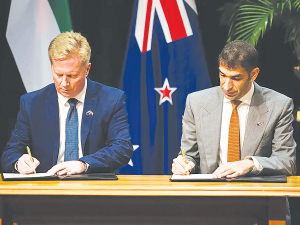ETS costs cut 66% for forest owners – McClay
Additional reductions to costs for forest owners in the Emissions Trading Scheme Registry (ETS) have been announced by the Government.
 Trade Minister Todd McClay and his UAE counterpart Minister of State for Foreign Trade Dr Thani bin Ahmed Al Zeyoudi in Wellington last week.
Trade Minister Todd McClay and his UAE counterpart Minister of State for Foreign Trade Dr Thani bin Ahmed Al Zeyoudi in Wellington last week.
There's been widespread praise from the primary and business sectors for the Government's speedy negotiation of a trade deal with the United Arab Emirates.
The NZ International Business Forum (NZIBF) describes the deal as a welcome bright spot which will help build further trade in the Middle East while Beef + Lamb NZ says it's a boost for hard-hit farmers.
According to Trade Minister Todd McClay, the deal - called a Comprehensive Economic Partnership Agreement (CEPA) - will unlock economic opportunities for Kiwi exporters and create stronger supply chains with one of our most important trading partners in the Gulf region.
The agreement took just over four months to negotiate and is one of the fastest agreements NZ has ever negotiated. It will see the UAE immediately eliminate duties on 98.5% of NZ exports when the deal takes effect and this will rise to 99% within three years.
"This will create new opportunities for New Zealand businesses in the dynamic UAE market, contributing to our ambitious target of doubling exports by value in ten years," McClay says.
This agreement was concluded in just over four months following the launch of negotiations on 7 May this year, making this New Zealand's fastest-ever trade agreement negotiation, and the most trade liberalising of any of the UAE's CEPAs to date.
McClay says the deal shows the Government's commitment to opening doors and reducing costs and barriers for Kiwi exporters.
"The UAE is a key export destination and hub in the Gulf region. In the year to June 2024, two-way trade was valued at NZ$1.3 billion. The UAE is one of our largest markets in the Middle East, and a top 20 export market overall," he says.
Currently NZ dairy exports to the UAE amount to $718 million, red meat $46 million and horticulture $44 million.
In addition, NZ exports $237 million in industrial products and tourism accounts for $31 million. NZ imports around $152 million of products and services from the UAE including plastics, carpets, travel services and glass.
Stephen Jacobi, the executive director NZIBF, says while the deal is called a 'Closer Economic Partnership Agreement' CEPA, it is for all intents and purposes a Free Trade Agreement.
"It's just a linguistic issue because it is a preferential trade agreement.
"It has all the elements of previous FTAs including market access and a reduction in tariffs, trade rules; all the ones we would associate with things like rules of origin, customs procedures, trade facilitation and digital economy competition," he says.
Although he hasn't seen the final text, he believes that it has chapters relating to the environment and labour. He says the issue of investment is a side agreement which is simply how the UAE prefers it to be.
Jacobi says the days of the big transformational FTAs such as those with the EU and the UK, are over but this is the type of deal we'll see more of in the future, which is still great news for NZ.
Jacobi says while such an agreement may be a basis for future deals, he says in the case of India, a deal with that country is likely to be less comprehensive than that with the UAE.
Former Fonterra executive Alex Turnbull has been appointed CEO to lead all five Yili Oceania Business Division companies in New Zealand.
Fonterra executive René Dedoncker is leaving the co-operative later this year to lead Australian agribusiness Elders.
Alliance Group and the Southland Stags rugby team have joined forces in a partnership that will see the the meat co-operative's farmgate brand feature on players' team kits and replica jerseys.
Fonterra's plan to expand its organic programme to the South Island is being well received by farmers, the co-op says.
Voting has started for the renewal of DairyNZ's milksolids levy.
The most successful catchment groups in NZ are those that have 'a source to sea' approach.

OPINION: Here w go: the election date is set for November 7 and the politicians are out of the gate…
OPINION: ECan data was released a few days ago showing Canterbury farmers have made “giant strides on environmental performance”.